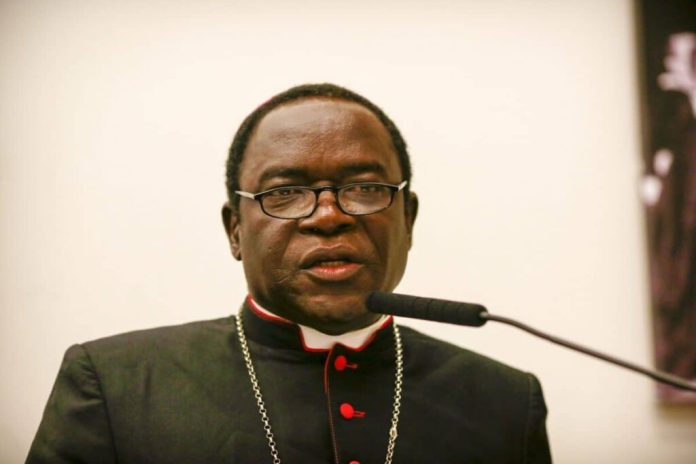
The Catholic Bishop of Sokoto Diocese, Matthew Kukah, has emphasised that the process of electing a Pope is guided by divine inspiration, not political entitlement or regional considerations.
Speaking on Channels Television’s Political Paradigm, shortly after returning from the inauguration of Pope Leo XIV in Rome, Bishop Kukah reflected on the significance of the papal installation, the role of religious leaders, and the moral responsibilities of African leaders.
Kukah, who also witnessed the burial of Pope Francis, noted the Vatican’s enduring role as a global hub of moral diplomacy. “Every square inch of that territory is a space for negotiation at the highest level,” he said, recalling moments such as world leaders quietly engaging in private conversations during papal events. The inauguration of a Pope, he added, draws global attention, not just due to religious importance but because of the Vatican’s influence as a moral compass.
He described the presence of President Bola Tinubu at the inauguration as historic, noting it was the first time a sitting Nigerian President attended such an event. While former President Olusegun Obasanjo was present at Pope John Paul II’s burial, Kukah highlighted that the recent encounter, which saw President Tinubu share a moment of conversation with Pope Leo XIV, was symbolic, especially given both men’s connections to Chicago.
Responding to opinions advocating for an African Pope, Kukah dismissed such expectations as misguided. “Let’s win the World Cup first,” he quipped, stressing that the Papal election is not a turn-by-turn affair. “It’s not an ‘Emilokan’ scenario,” he said, referencing the Yoruba expression meaning “It’s my turn,” which gained political traction in Nigerian politics. Kukah argued that the process transcends human calculation and lobbying, asserting that the Holy Spirit ultimately guides the outcome. With 133 cardinals participating in the election, many unfamiliar with each other, he explained that the process is devoid of politicking and manifesto-driven ambitions.
While some view the Pope’s global influence as an opportunity for Africa to gain support from the international community, Kukah offered a candid perspective. “Nigeria is not Sudan, we’re not Gaza… we are a heck of a country with massive resources,” he said. He asserted that Africa’s development does not rest on the Pope’s shoulders, but on the integrity and competence of its leaders. Referring to Pope Francis’s 2023 visit to Congo, Kukah recalled his call for the international community to take its hands off Africa — a sentiment that reflects the Pope’s moral stance rather than political intervention.
He also dispelled the notion of a regionally biased Pope, saying, “There’s nothing like an African Pope. You can have a Pope who is African, but not an African Pope.” He explained that once elected, the Pope’s identity becomes universal, with no preferential ties to their homeland. Drawing on examples of past Popes, he emphasised that the office demands complete devotion to the global Church, not familial or regional loyalties.
Kukah delved into the complex relationship between religion and politics in Nigeria, warning against the politicisation of religious and traditional institutions. He highlighted the post-colonial tensions that continue to influence Northern Nigeria, tracing them back to the fall of the Sokoto Caliphate in 1903. With colonial restructuring stripping traditional rulers of their authority, the consequences of those disruptions still linger today, he said.
While Islam historically sought to build a theocracy, Christianity, according to Kukah, introduced a liberal outlook where individuals could thrive. However, Nigeria’s political structure has failed to draw clear boundaries between religion and state. Section 10 of the Constitution, which prohibits any state from adopting a religion, remains largely unimplemented in practice, he said, describing the balance between religion and governance as “very delicate.”
Kukah warned against projecting religious or ethnic expectations onto leadership. “We Africans like to make this projection: the President is from my town, therefore it’s our turn,” he said. Instead, he urged African leaders to focus on governance that unites all citizens under a common legal framework. “Islam can be a source of law, Christian values can be a source of law, and African traditional rights can be a source of law. But all of us must become citizens under one law.”
Touching on the place of traditional rulers in modern governance, Kukah referenced a book by INEC Chairman Mahmood Yakubu that explores the evolving relationship between traditional rulers and politicians. He lamented that traditional institutions, once manipulated by colonial powers for administrative purposes, remain subject to political influence in contemporary Nigeria. “The modern Nigerian state has not improved on that relationship,” he said.
He also clarified the distinction between religious and traditional leadership. While traditional rulers may wield cultural influence, they are not necessarily spiritual leaders. “A bishop must produce a certificate of theological training. A traditional ruler needs only the goodwill of the governor,” he said, pointing to the politically motivated installation and removal of traditional rulers as problematic.
Kukah concluded by cautioning against entangling traditional institutions further in national politics. He cited the growing number of legal disputes involving traditional authorities in countries like Ghana and urged thoughtful consideration before attempting constitutional amendments that could disrupt the already fragile balance between Nigeria’s diverse governance structures.



